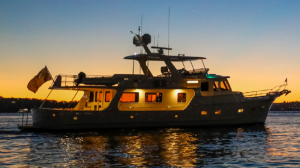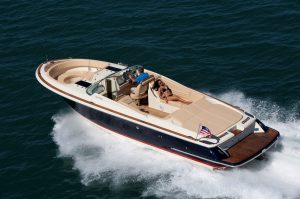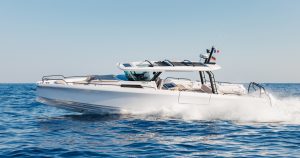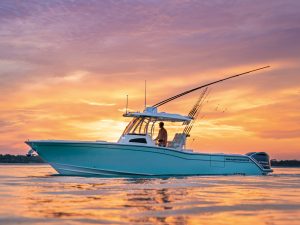Pontoon Boats for Sale: Need-to-Know Guide for Buyers
Pontoon boats are versatile, shallow-draft watercraft designed with tubular floats, making them perfect for a wide range of activities such as entertaining, party barges, or small ferries with large capacity seating. Built on top of two or three interconnected, buoyant tubes, these pontoons form the hull of the vessel, which is then topped by a large, flat deck.
With a vast selection of pontoon boats for sale, it is essential for potential buyers to consider various factors before making a purchase. The size and type of pontoon boat are crucial, as they can determine the boat's capacity and horsepower. Other considerations include preferred usage, location, and choice of popular pontoon boat brands such as Bennington, Escape, Manitou, Harris, and Lowe.
Prospective buyers should also be aware that the length of the pontoon boat can affect the amount of horsepower available, with larger engines often requiring a third toon. Taking into account the intended use of the boat and the specific body of water it will be utilized in can help in making an informed decision when browsing through available pontoon boats for sale.
Pontoon Boat Basics
Pontoon boats are a popular choice for a variety of recreational activities due to their versatility and stability. They are characterized by their buoyant tubes called pontoons, which support a large, flat deck. In this section, we will discuss the types of pontoon boats, pontoon tube design, and the different sizes available.
Types of Pontoon Boats
There are two main types of pontoon boats: those with two pontoons and those with three, which are also known as tri-toons. The choice between the two types depends on the intended use of the boat, as well as user preferences. Two-pontoon boats are generally more affordable and easier to maneuver, while tri-toons offer more stability and a smoother ride in rougher waters.
Pontoon Tube Design
The pontoons themselves can vary in design and material. They are usually made from aluminum or sometimes fiberglass, and are hollow to provide buoyancy. Some pontoons feature a round or U-shaped design while others adopt a V-shaped or flat-bottomed approach. The choice of design can impact the boat's performance, stability, and maneuverability. Round or U-shaped pontoons tend to perform better in calm waters, while V-shaped or flat-bottomed pontoons provide better stability and can handle choppier water conditions.
Sizes
Pontoon boats come in a range of sizes to accommodate different activities and preferences. The size of a pontoon boat not only refers to its length but also its deck width, or "fence" size. Smaller boats are typically between 14-16 feet in length and suitable for activities such as fishing or small group outings. Medium-sized boats can range from 18-24 feet, offering more space for larger groups or parties. Finally, larger pontoon boats can reach lengths of 26-30 feet or more, providing ample space for activities like entertainment, water sports, or even as small ferries with large capacity seating.
Materials and Construction
Boatbuilding Materials
Pontoon boats are constructed using a variety of materials, including fiberglass, aluminum, and steel. Fiberglass is a popular choice for boat builders due to its durability, strength, and resistance to water damage. Aluminum is favored for its lightweight properties, while steel is often used for the pontoons due to its sturdiness and resistance to corrosion.
Flooring Options
When it comes to flooring options for pontoon boats, there are several choices available. Plywood is a traditional choice, as it is sturdy and provides a solid base for the boat's deck. However, it may require additional waterproofing and maintenance to prevent rot and deterioration.
Vinyl flooring is another popular option, as it is resistant to water damage, easy to clean, and requires minimal maintenance. For those seeking a more luxurious option, carpet is often chosen for its comfort and aesthetic appeal. However, it may require more care to prevent mold and mildew, as well as regular cleaning to maintain its appearance.
Outdoor Fabrics
Earlier, pontoon boat lifts didn't have. In today's pontoon boats, you can find a wide range of outdoor fabrics that are both durable and stylish. These fabrics are used for upholstering seating, creating biminis, and providing storage options. They are specifically designed to withstand harsh conditions and prolonged exposure to sunlight and water, ensuring they remain in good condition throughout the life of the boat.
Remember to prioritize quality boatbuilding materials and construction methods when shopping for a pontoon boat, as these factors will play a big role in the boat's longevity and overall enjoyment of the vessel.
Engines and Performance
Pontoon boats can be equipped with a variety of engine types and sizes to suit various needs and preferences. Understanding the available options can help you make a more informed decision when looking for a pontoon boat for sale.
Engine Types
Pontoon boats typically utilize outboard engines due to their ease of installation, maintenance, and versatility. There are several types of outboard engines, including:
- Gasoline Outboard Engines: These engines are powered by gasoline and come in both two-stroke and four-stroke (outboard-4s) variants.
- Electric Outboard Engines: These engines are battery-powered and offer low noise and environmentally friendly operation. However, their performance is often limited to low-speed cruising.
- Inboard/Outboard Engines: Also known as sterndrive engines, these units combine the features of both inboard and outboard engines, offering better performance and maneuverability at higher speeds. They are less common on pontoon boats due to their complexity and cost.
Horsepower
The horsepower of pontoon boat engines can range from 9.9HP up to 600HP (Barletta Pontoon Boats). Smaller pontoons may require less horsepower, while larger and more performance-oriented models may necessitate higher horsepower engines for greater speeds and better handling. It is essential to consider the length of your pontoon boat, as it could cap the amount of horsepower you can have.
Outboard Manufacturers
There are many outboard engine manufacturers to choose from, with popular brands such as Mercury, Yamaha, Honda, and Evinrude. Each brand offers a wide range of engine options with varying levels of horsepower, fuel efficiency, and reliability. Conducting thorough research and consulting expert opinions can help you determine the best fit for your specific requirements.
Propulsion Systems
The propulsion system of a pontoon boat involves the engine and propeller system that determines how the boat moves through the water. Factors to consider when selecting a propulsion system for your pontoon boat include:
- Preventing prop ventilation with crew seated forward
- Minimizing vibration
- Delivering low-speed thrust
- Determining optimum mounting height
- Providing directional control
Understanding these factors will help ensure a smooth and comfortable ride. The right combination of engine type, horsepower, and propulsion system will ensure optimal performance and an enjoyable boating experience.
Top Brands and Manufacturers
When looking for a pontoon boat, it's essential to consider the top brands and manufacturers in the market. These companies are known for producing high-quality pontoon boats that cater to various needs and preferences.
Bennington is a popular choice among pontoon boat enthusiasts. With a reputation for quality and innovation, Bennington boats are designed to meet the needs of every boating lifestyle.
Another industry leader is Harris, known for their luxury pontoon boats, such as the Grand Mariner 250. They offer cutting-edge features and technology to provide an unparalleled boating experience.
Sun Tracker is a reputable manufacturer that offers budget-friendly options without sacrificing quality, like the Bass Buggy 16 DLX. These boats are perfect for fishing enthusiasts and families looking for recreational fun on the water.
For a combination of versatility and style, Barletta is another excellent choice. With a focus on exceptional craftsmanship, their pontoons make a strong statement on the water.
With a passion for performance, Sylvan manufactures some of the best pontoon boats available, such as the L-3 DLZ. They balance luxury with affordability to create the perfect watercraft for different boating preferences.
Avalon is another major player in the pontoon boat market, offering models like the Venture Quad Lounger. Their pontoon boats feature innovative design and are built for durability and performance.
Amenities and Customization
Seating and Lounge Areas
Pontoon boats offer a variety of seating options, from standard bench seats to luxury lounges. Many models feature customizable seating arrangements, allowing you to tailor the layout to your specific needs. High-quality upholstery, often resembling that found in luxury automobiles, ensures comfort and durability.
Lounge areas may include reclining seats, chaise lounges, and wraparound seating, creating spaces for both relaxation and conversation. Carefully consider your typical boating activities, as well as the number of guests you'll host, when selecting seating and lounge configurations.
Bimini Top and Sun Pads
A Bimini top is a popular add-on for pontoon boats, providing shade and protection from the sun. These fabric tops are available in several sizes and colors, allowing you to customize the look and coverage of your boat. Sun pads are another popular feature, offering a comfortable space to lay out and enjoy the sun.
When choosing a Bimini top, consider the amount of coverage desired and the climate in your boating area. For sun pads, the available space on your pontoon boat and the type of upholstery material should be taken into account.
Livewells and Fishing Features
For boaters with an interest in fishing, livewells can be an essential add-on. These built-in tanks provide a space to store live bait or temporarily hold caught fish. Many pontoon boats also offer other fishing features, such as rod storage, rod holders, and integrated tackle storage.
Consider the types of fishing you plan to do and the frequency of your fishing trips when choosing fishing features on your pontoon boat.
Watersports and Entertainment
Pontoon boats can be equipped for a variety of watersports, with some models even featuring a double-decker design complete with a waterslide. Tow bars or ski pylons can be added for activities such as wakeboarding, water skiing, and tubing. Additionally, entertainment options like built-in audio systems and speakers, as well as barbecue grills and refreshment centers, can enhance the overall boating experience.
When customizing your pontoon boat for watersports and entertainment, consider the interests of your passengers and the type of watersports you'll engage in most frequently.
Selecting the Right Pontoon Boat
Activities and Purposes
When selecting the right pontoon boat, it is essential to consider the activities and purposes for which you intend to use the vessel. There are a variety of pontoon boats designed for specific activities such as fishing, cruising with family, or freshwater trips. Performance pontoon boats are specially designed for day cruising and increased speed, while fishing pontoons have fishing-specific features and storage options.
Budget and Pricing
Pontoon boat costs can vary greatly depending on the power options, engines, onboard features, equipment, amenities, and brand. For instance, new outboard engines, especially larger ones, can significantly impact the overall price of the boat. It is crucial to set a budget and consider the ongoing maintenance and operating costs before making a purchase.
Location and Water Conditions
Another important factor to consider when selecting a pontoon boat is the location and water conditions you will primarily encounter. Whether you plan to use your boat in freshwater lakes and rivers, or saltwater bays and estuaries, each environment requires specific features and materials that adapt to the water conditions.
For saltwater environments, look for boats with additional corrosion protection to minimize damage. In shallow draft areas, smaller pontoon boats will perform better and provide easier maneuverability. Additionally, consider your local waterway's size restrictions when selecting a boat, as certain bodies of water may have limitations on boat size and horsepower.
Where to Buy
When looking for pontoon boats for sale, you can choose from several options, including private sellers, boat dealerships, and boat trader websites. Each option comes with its advantages and considerations.
Private Sellers
Buying a pontoon boat from a private seller can be a more affordable option. You can often find listings in local classifieds or online platforms such as Craigslist.
When dealing with private sellers, always inspect the boat in person and verify ownership documentation. Keep in mind that you may not receive the same level of service, support, or warranties that you would get from a dealership.
Boat Dealerships
Boat dealerships are a popular option for purchasing pontoon boats, as they often provide warranties, financing options, and professional support. Some manufacturers, like Barletta Pontoon Boats, offer dealer locator tools on their websites, allowing you to find dealerships near you by entering your zip code.
Visiting your local boat dealership is a good choice if you are unsure of which brand to choose, as you can compare various models and receive expert guidance. Remember to research and compare prices between dealerships to ensure you get the best deal on your pontoon boat.
Boat Trader Websites
Boat trader websites, such as Boat Trader and boats.com, offer an extensive selection of pontoon boats from different manufacturers, making it easier to find the perfect boat for your needs. These platforms allow you to filter search results by price range, location, and other criteria.
When using boat trader websites, pay close attention to the boat's specifications, photos, and descriptions. Always arrange a personal inspection before making a purchase and be cautious with online transactions.
Pontoon Boat Pros and Cons
Pontoon boats have a unique set of advantages and disadvantages that can impact the satisfaction of their owners. It's essential to carefully consider these factors before making a purchase.
Pros:
- Pontoon boats are known for being perfect for family activities due to their spaciousness and safety features.
- Various size options are available, ranging from 18 to 24 feet or larger, which can accommodate different group sizes and water conditions. For 2-6 people choose a pontoon between 18 to 20 ft., for 6-10 people choose a pontoon between 22 to 24 ft., and for more than 10 people you will want to consider a pontoon 24 ft. or larger.
- Adding a third toon, or "tri-toon", can provide better performance and improved handling with larger engine options.
Cons:
- One downside of pontoon boats is that they are generally slower than V-hull boats of the same length, as noted by BoatBlurb.
- The length of your pontoon boat may limit the amount of horsepower you can have, which can impact performance and capabilities (Barletta Pontoon Boats).
- Tri-toon boats may be more expensive than traditional two-tube pontoon boats, which could be a significant factor in your purchasing decision.
Evaluating the pros and cons of pontoon boats can help prospective buyers make an informed decision that aligns with their needs and preferences.
Maintenance and Ownership
Standard Features
When purchasing a new pontoon boat, it is essential to be familiar with the standard features that come with the boat. These features typically include comfortable seating, storage compartments, a helm console, a Bimini top, and a sound system. For the longevity and optimal performance of your pontoon, regular maintenance such as cleaning and inspections should be performed. After every boating session, always clean your boat, even if it is just a casual hose down (Pontooners).
Fuel Tank and Usage
The fuel tank size varies depending on the pontoon boat's length and the engine requirements. It is crucial to check the pontoon boat's engine and fuel tank periodically (Watercraft 101). When using your pontoon boat for the first time, be aware of the engine's break-in period, which should be followed according to the dealer's recommendations (Barletta Pontoon Boats). Keeping track of fuel usage helps in planning trips and avoiding unexpected fuel shortages during a boat outing.
Taxes
When purchasing a new pontoon boat, it is essential to consider the taxes associated with boat ownership. Taxes may vary depending on the state and the boat's length, age, and value. It is recommended to check your local and state tax regulations to ensure compliance and proper budgeting for your pontoon boat's maintenance and ownership costs.










